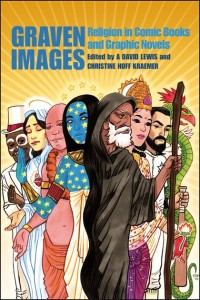Consider this link to Graven Images: Religion in Comic Books and Graphic Novels just a placeholder until Sacred and Sequential is officially launched.

Consider this link to Graven Images: Religion in Comic Books and Graphic Novels just a placeholder until Sacred and Sequential is officially launched.

For Immediate Release
Islam and Comic Books Column “Comics & Dialogue” Launches in February
January 28, 2014. BOSTON, MA. Beginning in February, ISLAMiCommentary will feature twice-monthly columns from Boston scholar Dr. A. David Lewis on Islam and the comic book medium. The column series Comics & Dialogue: Islam in Graphic Novels expands on Dr. Lewis’s previous work from the American Academy of Religion (AAR) annual conference and the Harvard University Center for Middle East Studies (CMES).
The following advance excerpt was provided from Dr. Lewis’s initial column outlining the goals of the series:
Muslim characters have appeared in American comic books for nearly as long as the market has existed. Yet, little analysis or examination has been devoted to them by Comics Studies and Religious Studies in tandem, certainly little within access of interested readers and informed spectators. The best scholarship on Islam in U.S.-market comics may get lost in unrecognized journals or far corners of the Internet. To remedy this in good faith, these columns will highlight both the latest instances of the medium’s interaction with the religion of Islam as well as the recent history of their engagements.
Lewis notes that it’s no coincidence his columns will begin the same month as Marvel Comics launches Ms. Marvel, their first title headlined by a Pakistani-American teenage Muslim superheroine, Kamala Khan. “I’m very excited for what Willow [Wilson] is bringing to the superhero genre as a writer and as a Muslim. But, as all the press coverage on this development has proven, there needs to be more informed and reliable information about comics and Islam together than can currently be accessed..”
In addition to analyzing this relatively new trend of the mainstream Muslim super-heroine, Lewis will also address in his columns the earliest portrayals of Muslim heroes in comics, grassroots attempts to produce comics featuring Muslims, and particular instances of the medium being used to promote Islamophobia.
“We are excited about this new partnership with Dr. Lewis, and are looking forward to increased engagement of the public and other scholars with his dynamic field of study, “ said Julie Poucher Harbin, Editor of ISLAMiCommentary.
ISLAMiCommentary is a public scholarship forum managed by The Duke Islamic Studies Center in partnership with the Carolina Center for the Study of the Middle East and Muslim Civilizations (UNC-Chapel Hill) and the Oxford Centre for Islamic Studies (a Recognized Independent Centre of at University of Oxford). Supported by a grant from the Carnegie Corporation of New York, it aims to inform public discourse and policy on Islam and Muslim communities from a variety of perspectives.
A. David Lewis, Ph.D., is the co-editor of Graven Images: Religion in Comic Books and Graphic Novels, co-author of Some New Kind of Slaughter from Archaia Entertainment, and a founding member of Sacred & Sequential, a collective of religious studies and comics studies scholars.
Hanukkah catch you off-guard during Thanksgiving? Have a gentile interested in Hebraic culture for Christmas? Then look no further than Yiddishkeit: Jewish Vernacular and the New Land, edited by Paul Buhle along with the late and revered Harvey Pekar.
James Bucky Carter at En/Sane World says, “Mench up and stop being a putz,” urging people to get it, especially as it also features work by Danny Fingeroth, Neil Kleid, Spain Rodriguez, Peter Kuper, Nick Thorkelson, and David Lasky.
Tablet makes an even better argument for reading it, suggesting that Yiddish has a necessary abrasiveness which perhaps has saved it from getting entirely lost in assimilation. Their site also features excerpts from the book, so why not give it a read, nu?

In August, Sequart featured an essay by the University of Calgary’s Tom Miller writing on the “transformation project” of Christian comics. Though he admits to a “small sample,” Miller focuses the essay’s attention on a particular category of Christian comics, namely “the holy works adaption” and its “two sub-categories: the tribute and the telling.”
He differentiates between the two by noting that ‘tellings’…
…eschew the poetry of the source material. Spiritual matter aside, the Bible is a work of beautiful poetry. So perhaps another answer to the question of what these texts bring to the original is a negative answer: they bring a removal of the poetry of the Bible. This removal of poetry is one of the most significant differences between the telling and the tribute adaptations, as we will see.
Miller alludes to two other categories of Christian comics beyond holy works adaptations, so perhaps Sequart will have Miller produce two sequel essays in the not-too-distant-future.
Besides “Contact,” ignore those other pages at the top. They’re still in development.